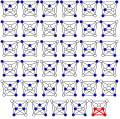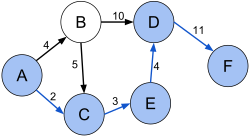computer science The P versus NP problem is a major unsolved problem in theoretical computer science. Informally, it asks whether every problem whose solution...
63 KB (7,784 words) - 06:53, 25 April 2025
computational complexity theory, a problem is NP-complete when: It is a decision problem, meaning that for any input to the problem, the output is either "yes"...
30 KB (3,617 words) - 20:05, 16 January 2025
solve than all problems in NP, but they are probably not NP-hard (unless P=NP). A decision problem H is NP-hard when for every problem L in NP, there is a...
9 KB (1,119 words) - 00:35, 28 April 2025
Unsolved problem in computer science P = ? N P {\displaystyle {\mathsf {P\ {\overset {?}{=}}\ NP}}} More unsolved problems in computer science In...
21 KB (2,784 words) - 18:11, 6 May 2025
the more commonly known problems that are NP-complete when expressed as decision problems. As there are thousands of such problems known, this list is in...
29 KB (2,746 words) - 00:31, 24 April 2025
theory, co-NP is a complexity class. A decision problem X is a member of co-NP if and only if its complement X is in the complexity class NP. The class...
7 KB (964 words) - 05:30, 9 May 2025
21 NP-complete problems are a set of computational problems which are NP-complete. In his 1972 paper, "Reducibility Among Combinatorial Problems", Richard...
5 KB (491 words) - 02:47, 13 May 2025
Vertex cover (redirect from Vertex cover problem)
graph. In computer science, the problem of finding a minimum vertex cover is a classical optimization problem. It is NP-hard, so it cannot be solved by...
22 KB (2,556 words) - 03:39, 11 May 2025
the first problem that was proven to be NP-complete—this is the Cook–Levin theorem. This means that all problems in the complexity class NP, which includes...
50 KB (5,045 words) - 15:59, 11 May 2025
Hamiltonian cycle. The Hamiltonian path problem and the Hamiltonian cycle problem belong to the class of NP-complete problems, as shown in Michael Garey and David...
21 KB (2,518 words) - 19:02, 20 August 2024
computational complexity, an NP-complete (or NP-hard) problem is weakly NP-complete (or weakly NP-hard) if there is an algorithm for the problem whose running time...
2 KB (429 words) - 23:56, 28 May 2022
complexity, strong NP-completeness is a property of computational problems that is a special case of NP-completeness. A general computational problem may have numerical...
4 KB (642 words) - 19:47, 7 May 2023
scheduling problems. The NP-hardness of the unweighted longest path problem can be shown using a reduction from the Hamiltonian path problem: a graph G...
22 KB (2,662 words) - 06:47, 12 May 2025
is NP-hard, but can be solved efficiently in practice. The partition problem is a special case of two related problems: In the subset sum problem, the...
19 KB (2,439 words) - 22:45, 12 April 2025
computational complexity, problems that are in the complexity class NP but are neither in the class P nor NP-complete are called NP-intermediate, and the...
15 KB (1,534 words) - 13:30, 1 August 2024
precisely T {\displaystyle T} . The problem is known to be NP-complete. Moreover, some restricted variants of it are NP-complete too, for example: The variant...
25 KB (3,781 words) - 08:41, 9 March 2025
Conjecture (section P versus NP problem)
asked whether a certain NP-complete problem could be solved in quadratic or linear time. The precise statement of the P=NP problem was introduced in 1971...
25 KB (3,042 words) - 09:56, 6 October 2024
Unique games conjecture (category Unsolved problems in computer science)
and P ≠ NP, then for many important problems it is not only impossible to get an exact solution in polynomial time (as postulated by the P versus NP problem)...
28 KB (3,066 words) - 15:57, 24 March 2025
states that the Boolean satisfiability problem is NP-complete. That is, it is in NP, and any problem in NP can be reduced in polynomial time by a deterministic...
19 KB (2,354 words) - 04:22, 13 May 2025
are used. #P-complete problems are at least as hard as NP-complete problems. A polynomial-time algorithm for solving a #P-complete problem, if it existed...
7 KB (849 words) - 16:01, 27 November 2024
problem is solvable in polynomial time, GI would equal P. On the other hand, if the problem is NP-complete, GI would equal NP and all problems in NP would...
41 KB (4,214 words) - 00:03, 25 April 2025
#P (pronounced "sharp P" or, sometimes "number P" or "hash P") is the set of the counting problems associated with the decision problems in the set NP...
7 KB (944 words) - 15:48, 17 January 2025
covering is NP-complete. It is one of Karp's 21 NP-complete problems shown to be NP-complete in 1972. The optimization/search version of set cover is NP-hard...
20 KB (2,683 words) - 15:26, 23 December 2024
computational problems that are co-NP-complete are those that are the hardest problems in co-NP, in the sense that any problem in co-NP can be reformulated...
3 KB (369 words) - 23:34, 6 May 2021
problem are hard. The clique decision problem is NP-complete (one of Karp's 21 NP-complete problems). The problem of finding the maximum clique is both...
84 KB (9,905 words) - 06:48, 12 May 2025
makes the problem NP-complete (such problems are not believed to be efficiently solvable for large sets of data, see P = NP problem). Another NP-complete...
46 KB (4,764 words) - 14:36, 26 April 2025
conjecture, Hodge conjecture, Navier–Stokes existence and smoothness, P versus NP problem, Riemann hypothesis, Yang–Mills existence and mass gap, and the Poincaré...
24 KB (2,626 words) - 06:37, 6 May 2025
Euclidean Steiner tree problem is NP-complete, since membership to the complexity class NP is not known. The rectilinear Steiner tree problem is a variant of...
35 KB (4,391 words) - 03:09, 29 December 2024
possible). Just as NP has NP-complete problems via many-one reductions, #P has #P-complete problems via parsimonious reductions, problem transformations...
2 KB (169 words) - 22:27, 31 May 2024
Combinatorial optimization (redirect from NP optimization problem)
discrete optimization problems are NP-complete, such as the traveling salesman (decision) problem, this is expected unless P=NP. For each combinatorial...
18 KB (1,847 words) - 03:45, 24 March 2025










